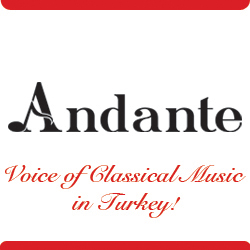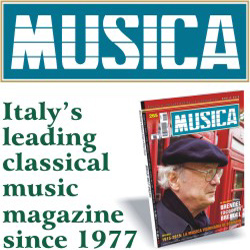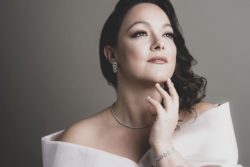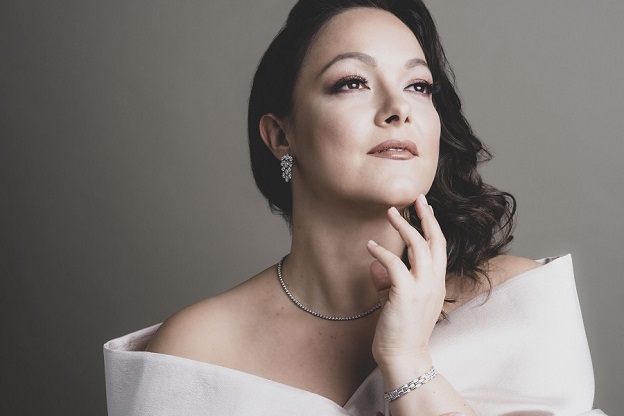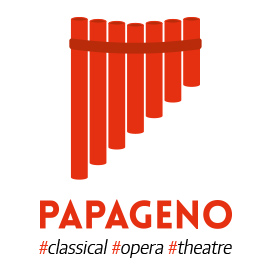Fresh from her personal success as Antonia in Tales of Hoffmann at La Scala, Eleonora Buratto is experiencing a particularly happy moment in her career: the Mantuan soprano, in fact, in recent years has racked up a series of debuts in a very wide repertoire, ranging from Rossini’s Otello to Puccini’s Butterfly, passing through that Verdi which, between Ernani and Don Carlo, increasingly appears to be the cornerstone of her current and future career. Nicola Cattò (from ICMA Jury member Musica) met (via Skype) with Eleonora Buratto the day after the end of performances of Offenbach’s opera Les Contes d’Hoffmann and just before she left for New York, where she sung Mimì in a series of performances of Bohème: the occasion was (also) to talk about the recording of Rossini’s Messa di gloria, conducted by Tony Pappano, which won the ICMA 2023 award in the Choral Music category.
Next year you will be celebrating 15 years of your career, yet because of the breadth of your repertoire and the prestige of the theatres in which you sing, it seems that many more have passed: is it already time for a first balance sheet?
Is that so? I had not realized that! Actually yes, a first balance sheet is also useful to remind yourself of the milestones you have reached, how you reached them, if there were any mistakes, to understand if you could have done better so as not to repeat, in the future, errors of judgment.
Like many singers, you started with a lighter repertoire, later veering toward that of pure opera: but Rossini is still very present. How did your approach to it change technically?
I actually wish Rossini had been part of my career even at the beginning: one role among many that I never got to sing is Fiorilla in Turco in Italia. In addition to concert productions (I’m thinking of Stabat Mater and Petite messe solennelle), fortunately, proposals came to me for grand operas such as Moïse et Pharaon and, indeed, Otello, sung in Pesaro: with proper technique and timing between productions, it is not impossible to sing both Butterfly and Desdemona. One needs to have a proper rest period. Last year after Butterfly I sang Bohème and, above all, the Alice in Falstaff, which allowed me to refresh that agility, that lightness that are vital in Rossini. Also because I don’t sing Cio-Cio-San by burdening the voice, but by respecting it, by playing with colours, by trying to differentiate the three acts by emphasizing the evolution from the naive child of the first to the final tragedy. This, in my opinion, is one way to ensure the health of the voice. But technique always comes first!
Also because, then, it depends which Rossini you sing: Desdemona is a Colbran role, which seems to me to be very suitable for your current voice…
Exactly, that’s right: the roles that I can keep in the repertoire are just that. And it is a great pleasure to sing them. Now I have two titles that I really want to tackle: Guillaume Tell and La donna del lago. Someone has even asked me for a Ermione…: it has to be carefully evaluated.
Let’s talk about this Messa di gloria: how did the recording come about?
I was not familiar with this music, my agency submitted the proposal to me, and so I read the score carefully. Since the dates would be just before the Verdi Requiem in Paris, I thought about it a bit, just because of what I said before. But it was a flattering proposal, and it went very well. I really wanted to work with Maestro Pappano, with whom I had only recorded the small role of the Priestess in Aida. During the music rehearsals and those with the orchestra, he helped me a lot to understand aspects of Rossini that I was approaching with a later point of view, coming in with too much heaviness in my voice: he did not ask me to “spoggiare” (remove the appoggio), but to lighten my voice and my way of thinking. He helped me to find a key for which I am very grateful to him: I was able to do agility and high notes in pianissimo, he helped me to rediscover aspects of my technique that I was no longer exploiting. And these are pages, for the soprano, that have a very high tessitura and very virtuosic. I don’t know when I will be able to see the Maestro again: there was a Puccini project with him in London (La rondine), but it was postponed.
For so many singers, working with Antonio Pappano is a unique experience: why, do you think?
I don’t want to narrow it down to him alone, lately I’ve had wonderful musical experiences with Daniele Gatti as well, but certainly there are conductors who are capable of conveying their musical idea to you, of getting you into a vision without, however, forcing you: they accompany you toward a reading, but without forcing you, indulging your voice and supporting you. For us singers this is a great thing, we are not left in the lurch.
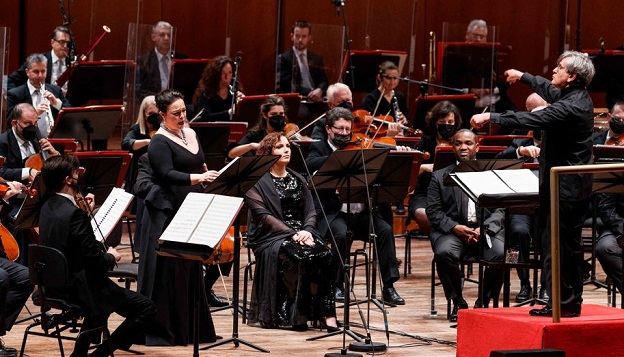
Eleonora Buratto singing Messa di gloria with Antonio Pappano in Roma, Auditorium Parco della Musica
©Accademia Nazionale di Santa Cecilia / Musacchio, Ianniello & Pasqualini
This recording goes along with the not too many you have done in the studio: what changes, psychologically and technically?
Actually, I have never worked in a real recording studio: both this Mass in Rome and the Petite messe in Luxembourg were recorded in the big hall, obviously without an audience. We worked, in both cases, with ensemble rehearsals that were recorded, and then live concerts also kept: all these files were used to create the best possible version. Maestro Pappano is very careful about this: he was very focused on the final outcome of the record. So much so that a complete performance, from beginning to end, we only did it on the evening of the first concert! Fortunately, everything went very well.
Besides the operatic, there is your concert career: how do you compose your recital programs?
I do not have much expertise on German Lieder, and so far I have not been asked to give such concerts, but rather evenings with opera arias; generally, I go at my own taste and get advice from the pianists I work with, for example Davide Cavalli (including at the recent Tebaldi 100). Where I don’t reach, I gladly ask for help: and I know who to ask. It will take some time to enrich this side of my repertoire.
Indeed, last year you brought impressive debuts to the stage: Butterfly, Bolena, Don Carlo. Do you think you have found the perfect balance in your repertoire today, between Verdi, Puccini and Belcanto? A balance that may bring to mind the young Tebaldi…
Yes, I have found my own balance, I am not afraid to refuse proposals that I find exaggerated, such as Tosca (which I will sing, but certainly not now), in function of my programming for the next few years, in which I have to deal with the other two Donizetti queens. I wish someone would think of me as Norma! I can’t complain, I have a wonderful calendar. If anything, I would like to live a little more on my income. I mean that once upon a time, when one debuted in a role, one would do a lot of performances, while it doesn’t happen to me. Last year I made four debuts, and only by coincidence did I happen to repeat one of them at a short distance (Elisabetta of Don Carlo in Florence), while Otello and Anna Bolena do not appear in my future. And this has happened to me in the past as well, from the very beginning of my career: I have only done Elisir twice (at La Scala and in Madrid), a role in which I could grow, and the same goes for Norina in Don Pasquale. Instead, I was constantly asked for new titles, in a way that was perhaps too fast. Ideally, there would be one debut a year: and again, this year there is Antonia in the Contes d’Hoffmann, Suor Angelica and Maria Stuarda, as well as Butterfly, which I will sing in Brescia in the version, precisely, of Brescia.
Butterfly is also the name of a charity project for you: would you like to tell us about it?
I have been a testimonial for years for research against epidermolysis bullosa, a rare and debilitating disease that leads people to be medicated daily because their skin is as fragile as a butterfly’s wings. There is no cure currently, however, it has been discovered that it involves the mutation of only one gene. Fundraisers are being done to support research and help the families of these children, who need care and attention: then it not only affects the outer skin but also the organ tissues, with all the problems that come with it. And there are varying degrees of the disease: those who manage to have an almost normal life (like the president of Debra Süditirol, the association I work with), and those who unfortunately cannot become adults.
You have already told me about future projects: something in the recording studio as well?
Yes! I will record a Verdi opera in 2024 for Opera Rara. And I am waiting for someone to ask me to record a solo CD!


